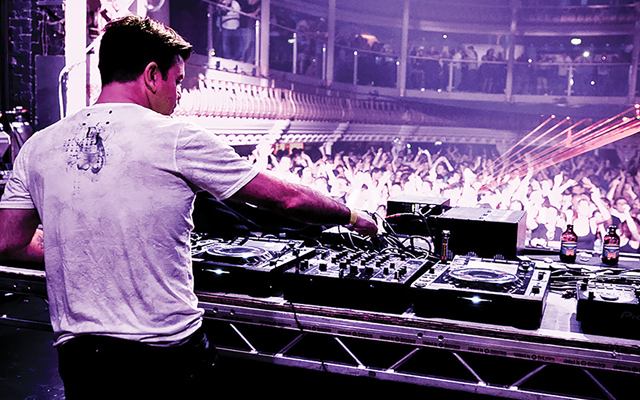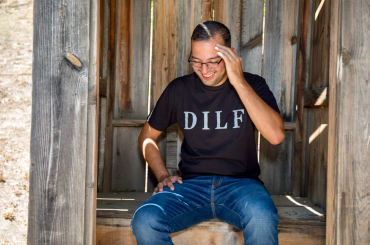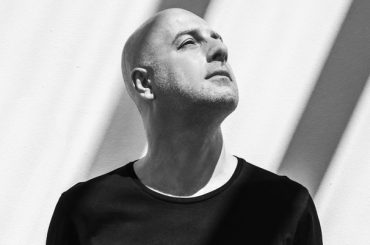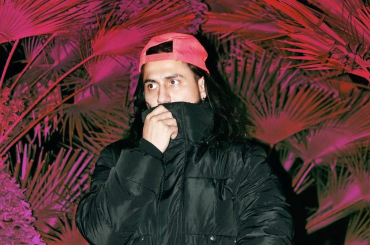It’s difficult to adequately convey the importance of Paul Oakenfold’s career on electronic music and its crossover into pop culture.
After bringing the acid house sound from Ibiza to England in the late 1980s, Oakenfold went onto much bigger things, like founding Perfecto Records in 1989 and eventually opening for U2’s “Zoo TV” stadium tour in 1992-93. Later, his stint as resident DJ at Liverpool’s Cream from 1997-1999 was nothing short of legendary, and he even crossed the pond to American stardom throughout the 2000s.
A pair of studio albums (2002’s Bunkka and 2006’s A Lively Mind) cemented his place as a legendary producer, plus his later work with Madonna and his 2009 Las Vegas residency at Rain—well before anyone dreamed of calling the city “The Ibiza of America”—drove it home.
Despite the dizzying heights he’s reached over the course of his career, it’s readily apparent that Oakenfold refuses to simply rest on his laurels. There’s a firm commitment to pushing the envelope, whether it’s sonically—his 2013 track “Venus” with Azealia Banks was a deft combination of trance, EDM, hip hop, and ’90s house—or commercially via the underground-focused Perfecto Fluoro counterpart to his Perfecto Records label. With more than 30 years in the dance-music world, Oakenfold knows better than anyone how to continually reinvent himself without sacrificing his identity.
DJ Times recently connected with Oakenfold shortly after the release of his new We Are Planet Perfecto compilation. The legendary DJ dished on the differences between Europe and America, finishing his long-awaited Pop Killer LP, and his plans for Perfecto’s 25th Anniversary in 2015.
DJ Times: The fourth volume of your We Are Planet Perfecto compilation series just came out. It’s dubbed FullOnFluoro. What does the compilation aim to showcase?
Paul Oakenfold: It’s the fourth in a series of compilations that we put out every year. It gives people a taste of what the label is doing, both from Perfecto and the more underground sound of Full On Fluoro. It showcases the music that I’m into from traveling the world and playing these kinds of tunes to the world, really. It’s pretty straightforward.
DJ Times: What went into picking the tracks for the compilation?
Oakenfold: The process takes a while, actually. We reach out to our favorite producers, various record labels, people we’ve been working with for a long time, and other artists and ask them to submit their new music. From there, we start to work on which tracks we like and are going to use. If there’s a track we like, but think the mix is wrong, we then go out to third parties and get them to remix the track into a style that I’m known for and that I would play. There’s a whole process that takes a lot of time. I think what we’ve tried to do overall as label with these compilations is stand for quality music since there’s so much music out there. We hear the same record on radios a lot and we hear the same record played by DJs at festivals a lot, and this is to share good music with the fan and the clubber.
DJ Times: You’ve also got some exclusives on the record. Who are they from?
Oakenfold: The exclusive tracks come from a lot of that. We go to in-house producers, fellow artists on the label, and collaborators and we ask them for exclusives to give the album some substance and make it a bit more special than your average compilation.
DJ Times: What goes into running your Planet Perfecto and Perfecto Fluoro labels, and what direction are you trying to take them?
Oakenfold: I’m very fortunate to have a good team of people around me who work at Perfecto. Perfecto is the main stable for the more commercial artists, while Full On Fluoro showcases the cutting-edge side of electronic music. It’s much more popular in Europe than the rest of the world and the [United States]. So that plays an important part of it. For instance, the music I played on three-week tour of Amsterdam, Israel and Budapest that I just finished is very different than what I’ll play in Las Vegas next Friday.
DJ Times: How are they different?
Oakenfold: It’s more commercial in Vegas. It’s more commercial in America—we know that. I mean, that’s understandable. There’s not anything wrong with that, but I think we’re all at a stage now—the journalists, the DJs, the promoters, and, most importantly, the clubber—of looking deeper for more meaningful music. We’re all aware that we’re just hearing the same things over and over again. I think that’s where the change is going to come for electronic music in America. I think you’re going to start to see the shift from the new, younger DJs who are trying to find their own sounds and moving away from the commercial moments that are out there now.
DJ Times: You spoke on the “Gamechangers” keynote panel with Arthur Baker, Daniel Haver at Amsterdam Dance Event recently. How was your ADE experience overall?
Oakenfold: My ADE experience was good! The “Gamechangers” panel was a great one. I ended up being roped onto another panel, which was strange. I ended up sitting on a panel with Disco Donnie. Junior Sanchez didn’t show up, so I sat on this panel with Dave Clarke and a big promoter from India who runs Sunburn, which is one of the best festivals out there. I was also a judge at the cook-off where all the DJs compete against one another.
DJ Times: You spent the earlier part of the year touring and promoting your Trance Mission album. What was it like to revisit your roots and has it had any effect on your current creative approach?
Oakenfold: Trance Mission did incredibly well, and obviously—first off—thank you to the people who supported and bought the record. That came about from a small tour we put together last year. I wanted to get back to playing small rooms and playing cutting-edge music, but people who attended were asking for me to play classics. I really didn’t want to, but through that came the idea of taking these classics from back in the day and giving them a modern twist with a 2014 sound. The reaction has been incredible. It was a good idea at the time, but we’re all about moving forward with new music. I don’t want to get stuck in an area of taking old classics; they can remain where they were.
DJ Times: For your latest single, “You Could Be Happy,” how’d you find your singer, Andrea McCluskey?
Oakenfold: Andrea McCluskey is an incredible vocalist. She has this haunting, wonderful sound, and she’s done a bunch of music for film and TV. I was a fan of hers, so we got introduced through a friend. The idea of working together really appealed to me, and I am really happy with the song. I don’t know if you’ve had a chance to listen to the downtempo version with no drums, but it really showcases her talent and how good she is.
DJ Times: And among all of this, you’re still working on Pop Killer, correct?
Oakenfold: Pop Killer is finished. It’s just now when we try to release it. I’ve still got to do a few mixes, but all the songs are there. That’s not until next year, so we’re not in a rush for that.
DJ Times: What other projects do you have in the pipeline?
Oakenfold: There’s a movie based on the electronic world that they asked me to play myself in, which I did. There are a few other colleagues of mine in it, as well. I’ve been working on the music for it, so I’m looking forward to that coming out. It’s Perfecto Records 25th anniversary next year, so that’s going to be a big moment. It revolves around Miami Music Week, so I’m sure Perfecto will be doing a big party then.








